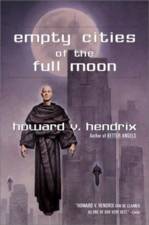

| Click on a book's image or title to order from Amazon.com |

Empty Cities of the Full Moon
Ace, PB, © 2001, 441 pp, ISBN #0-441-00844-5Reviewed November 2002
No one can accuse Howard V. Hendrix of not doing his research. Empty Cities of the Full Moon is peppered with metaphysical, religious, and scientific ideas and arguments, and plenty of literary references as well. But, as many readers know, ideas aren't enough to make a novel.
It's difficult to summarize the plot of the novel because there isn't much of one. In the year 2032, John Drinan crosses over from his universe to a parallel one, where a pandemic based on modified prions is destroying most of humanity. This causes them to undergo what analyst Mark Fornash considers a Shamanistic metamorphosis, going through phases of drumming, dancing and dreaming, and ending up with shapeshifting (literally!) and "soul-flying". As a result, most of humanity perishes, and most of the remainder have become shapeshifting and short-lived "Werfolk".
By 2065, the few remaining "Trufolk" live in the Bahamas in a society overseen by its creator, Cameron Spires, under occasional siege by the Werfolk, and protected in part by the genetically created Merfolk. A group of people who had lived through the plague as well as some of the current generation leave the Bahamas and slowly travel up the eastern US seaboard in search of answers to what happened.
I was tremendously frustrated with Empty Cities of the Full Moon. Writ large, it is a very standard, no-surprises story of people wandering around the US following the apocalypse. There are a few minor variations - the Werfolk, John Drinan's presence - but otherwise its plot doesn't really provide any excitement or stimulation. Similarly, the characters are very one-dimensional. There are the naive young lovers; the scientist; the engineer; the mystic; the fanatic (several of those, actually), and so forth. None of them really have a "story arc" through which they clearly grow or evolve. They're acted on, they're not really driving forces in the story.
Midway through the novel it hit me: Empty Cities does nothing more than demonstrate that Hendrix has carefully researched a wide variety of topics, and presents them all in great detail and in round-robin fashion. This leads to numerous, lengthy expository passages which, frankly, bored me and often had me skipping ahead by several sentences to see if there was any good stuff coming. As far as I could tell, there wasn't, really.
To the extent that Empty Cities tries to distinguish itself, it attempts this by trying to merge science, metaphysics and spirituality: To provide a scientific explanation for the outre behavior of the Werfolk and phenomena of the last days and the days after. I didn't really buy any of it, since it seemed like Hendrix was just handwaving as fast as he could, and his explanations were about as dull as I could possibly imagine them. I would have found the novel more plausible had it been presented as straight fantasy rather than as SF.
The novel is a letdown in other ways, too. Drinan's presence is a red herring (though I found his story - such as it was - more interesting than anyone else's). Alternating chapters occur in 2232-2233 and 2265-2266, thus robbing the collapse of civilization of any tension it might have had. Much of it occurs off-stage, anyway. Cameron Spires' plots and plans seem too abstract to have much emotional weight, and his downfall occurs (of course) because he deliberately puts himself in harm's way (though the convenient presence of omniscient and omnipresent forces help push things along). Plus, our heroes are constantly meeting people whom they know or have heard of, most of whom conveniently survived the pandemic; it exceeded credibility.
On the dustjacket, Locus claims that "Howard V. Hendrix can be claimed as one of our very best." This book works hard to contradict that assertion, failing to be either fun or exciting, and undercutting its potential to be thought-provoking by being long-winded and pedantic at every turn. It's one to avoid.
hits since 17 November 2002.